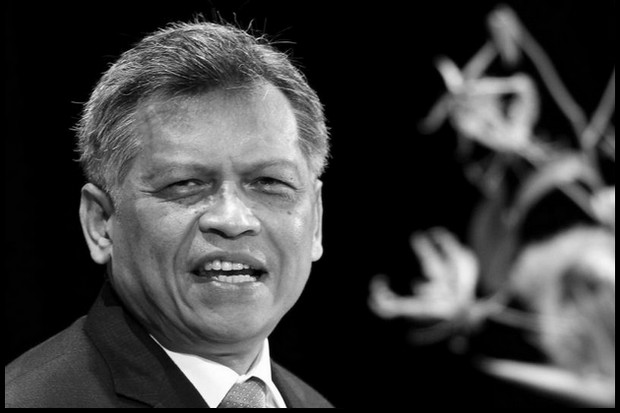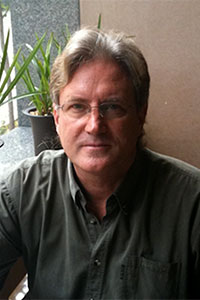
During Surin Pitsuwan's visit to Ithaca, New York, this past September, a barbecue party was arranged by long-time family friends who live on the edge of town where the still lush and green rural surroundings could at a glance be mistaken for rural Thailand. Chickens cackled in a nearby coop and birdsong was everywhere in the air.
The news of North Korean missile launches was very much a topic of concern and various opinions about North Korea's Kim Jong-un, almost invariably negative, were offered.
"You know, I met his grandfather, Kim Il-sung," Surin offered gently, stopping the conversation in its tracks. The picnic table grew quiet and all eyes turned to Surin. "He was a good host during the visit. He even took me aside and taught me a few Korean words, including kamsamnida, which means thank you."
How many people could say that? Conversation with the ever-grinning, soft-spoken Surin was full of surprises. He didn't demand attention but could command it with his quiet charisma and a ready store of knowledge. He was a good listener, he had a good sense of humour and spoke to people in all walks of life with curiosity and respect. The cast of characters he has conversed with is encyclopedic, ranging from scholars and stars to presidents, prime ministers and royalty, which is par for the course for diplomats, but Surin's service as both foreign minister and secretary-general of Asean made for an especially rich circle of acquaintances. Perhaps more extraordinary was the eagerness he had in sharing ideas with ordinary folk, an honest and abiding reflection of the upcountry boy he once was.
When the conversation turned to the UN, where Surin had been invited to consult on refugees, he was passionate about the plight of the Rohingya refugees driven from Myanmar to Bangladesh. A problem that the media has portrayed as all but intractable was a worthy challenge to him, and he said he wanted to be part of the solution to the problem.
Over dinner he reminisced fondly of student days in the US, though he was somewhat dismissive of Harvard's Samuel Huntington, who would be later known for his "Clash of Civilisations" thesis, and rather more appreciative of the eclectic, inclusive approach to the study of politics championed by Cornell's Ben Anderson, a dedicated Southeast Asia expert whom he met during thesis research.
Over the years I have seen Surin in vastly different milieu, and what is striking is how constant his presence felt despite his almost acrobatic ability to read the cues of the environment and react accordingly. Whether it was addressing the Thai Journalist Association, or speaking to my journalism seminar students at Chulalongkorn University, or chatting with Thai students in a fast-food restaurant in the US, he had an effortless way of reducing the distance, keeping it cordial and keeping it real.
A born diplomat, in the sense that he, like Barack Obama, was in possession of a first-rate disposition and not easily angered or offended, he nonetheless struggled to get things done in a world where being nice is not nearly enough. His example does suggest, somewhat counter-intuitively in the case of the rough and rumble of politics in Thailand, that taking the high road is the best way to go. His winning disposition and lack of personal greed served him well in the partisan and face-conscious world of Thai politics, a milieu ruled by powerful cliques where the greatest danger lies not in being corrupt but in being incorruptible.
Surin was not naive about the way things worked, but he chose to direct his attention elsewhere, even when trends were pointing the other way. He earned his political stripes as a Democrat and protégé of Chuan Leekpai, and remained loyal to those he trusted, so no amount of diplomat finesse was likely to bridge the gap when the ostentatious Thaksin Shinawatra replaced the mild-mannered Chuan Leekpai as prime minister, heralding a brash, noisier chapter of Thai politics. During that time, when Surin might otherwise have been considered an almost ideal candidate for Thailand to nominate for consideration of high office at the UN, he was sidelined and somewhat under siege. He was sometimes terse when using the phone, which he explained later, in person, as being due to his concern that his calls were monitored by the political opposition.
It was perhaps fitting that he reached the pinnacle of his career outside of Thailand as the secretary-general of the Association of Southeast Asian Nations since he was most himself as a bridge builder and internationalist. He did not take well to the periodic nationalistic paroxysms that have beset Thailand in recent years.
After his successful activist tenure as the region's top diplomat, his name had been bandied about in the Thai media as a possible candidate for prime minister, or even an appointed prime minister. I asked him about this, wondering if he was waiting to be "tapped."
"Oh, they approached me already," he said with a laugh. "And I said no." He said he was contacted after the military coup in May 2014 to consider a role in the unelected government. His personal sense of integrity and decorum required that he decline, politely of course. As the September sky darkened, the warmth of Ithaca's Indian summer persisted. We all talked late into the night, with crickets chirping and chickens running free in the grassy yard and a delightful toddler at play on the patio.
Talk turned to Ithaca's "central isolation" because Surin was working out a way to get to the UN for a meeting on refugees. "The airfare is so expensive, so I decided to go by bus," he said diffidently. Before leaving, he added that he enjoyed reading my commentary in the Bangkok Post and asked me to send him a copy of the piece I wrote about the late professor Ben Anderson. When I did, I got the following reply by email, and the effusive words he used therein apply as aptly to Surin as our shared intellectual mentor: "I enjoyed your eulogy of Ajarn Ben! He was a great soul! We are all better off because of his nobility of spirit and brilliance of mind!"
Philip J Cunningham is a media researcher covering Asian politics.
